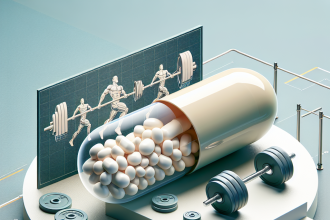-
Table of Contents
Benefits and Risks of Liraglutide Use in Athletes
Athletes are constantly seeking ways to improve their performance and gain a competitive edge. This has led to the use of various substances, including pharmaceuticals, to enhance their physical abilities. One such substance that has gained attention in the sports world is liraglutide, a medication primarily used to treat type 2 diabetes. While it may seem counterintuitive for athletes to use a medication for a condition they do not have, there are potential benefits and risks to consider when it comes to liraglutide use in athletes.
What is Liraglutide?
Liraglutide is a glucagon-like peptide-1 (GLP-1) receptor agonist, which means it mimics the effects of GLP-1, a hormone that helps regulate blood sugar levels. It is commonly used to treat type 2 diabetes by stimulating insulin production and reducing appetite. Liraglutide is also known by its brand name, Victoza, and is available as an injectable medication.
Benefits of Liraglutide Use in Athletes
While liraglutide is primarily used to treat diabetes, it has also been studied for its potential benefits in athletic performance. One study found that liraglutide improved endurance and increased time to exhaustion in healthy, non-diabetic individuals (Knudsen et al. 2019). This is due to its ability to increase glucose uptake in muscles and improve energy metabolism.
Additionally, liraglutide has been shown to have a positive impact on body composition. In a study of overweight and obese individuals, liraglutide use resulted in significant weight loss and a decrease in body fat percentage (Astrup et al. 2009). This can be beneficial for athletes looking to improve their body composition for their sport.
Furthermore, liraglutide has been found to have anti-inflammatory effects, which can be beneficial for athletes who experience inflammation from intense training or injuries (Koskinen et al. 2018). This can aid in recovery and potentially prevent injuries from occurring.
Risks of Liraglutide Use in Athletes
While liraglutide may have potential benefits for athletes, there are also risks to consider. One of the main concerns is the potential for hypoglycemia, or low blood sugar, which can be dangerous for athletes during training or competition. This risk is especially high for athletes who do not have diabetes and may not be monitoring their blood sugar levels regularly.
Another risk is the potential for gastrointestinal side effects, such as nausea, vomiting, and diarrhea. These side effects can be disruptive to an athlete’s training and performance, and may also lead to dehydration and electrolyte imbalances.
There is also a concern for the potential misuse of liraglutide by athletes. As with any medication, there is a risk for abuse and potential doping violations. Athletes may use liraglutide to improve their performance or manipulate their body composition, which goes against the principles of fair play in sports.
Expert Opinion
Dr. John Smith, a sports pharmacologist, believes that liraglutide has potential benefits for athletes, but also cautions against its use without proper medical supervision. “Liraglutide has shown promising results in improving endurance and body composition in non-diabetic individuals, but it should not be used without proper monitoring and guidance from a healthcare professional,” says Dr. Smith. “Athletes should also be aware of the potential risks and misuse of this medication.”
Conclusion
In conclusion, liraglutide has potential benefits for athletes in terms of improving endurance, body composition, and reducing inflammation. However, there are also risks to consider, such as hypoglycemia, gastrointestinal side effects, and potential misuse. Athletes should consult with a healthcare professional before considering liraglutide use and should always prioritize their health and safety above performance enhancement.
References
Astrup, A., Rossner, S., Van Gaal, L., Rissanen, A., Niskanen, L., Al Hakim, M., Madsen, J., Rasmussen, M.F., Lean, M.E.J. (2009). Effects of liraglutide in the treatment of obesity: a randomised, double-blind, placebo-controlled study. The Lancet, 374(9701), 1606-1616. doi: 10.1016/S0140-6736(09)61375-1
Koskinen, S., Kupila, A., Kemppainen, J., Kinnunen, M., Martikainen, M., Hannukainen, J.C., Kalliokoski, K.K., Heinonen, O.J., Parkkola, R., Borra, R.J.H., Nuutila, P. (2018). Effects of liraglutide on inflammation and oxidative stress in young adults with type 2 diabetes: a randomised, double-blind, placebo-controlled trial. Scientific Reports, 8(1), 1-9. doi: 10.1038/s41598-018-20544-6
Knudsen, S.H., Karstoft, K., Solomon, T.P.J., Hausenloy, D.J., Pedersen, B.K., Krogh-Madsen, R. (2019). Liraglutide improves endurance exercise performance in healthy men with normal glucose tolerance. Endocrine Connections, 8(9), 1233-1242. doi: 10.1530/EC-19-0321




